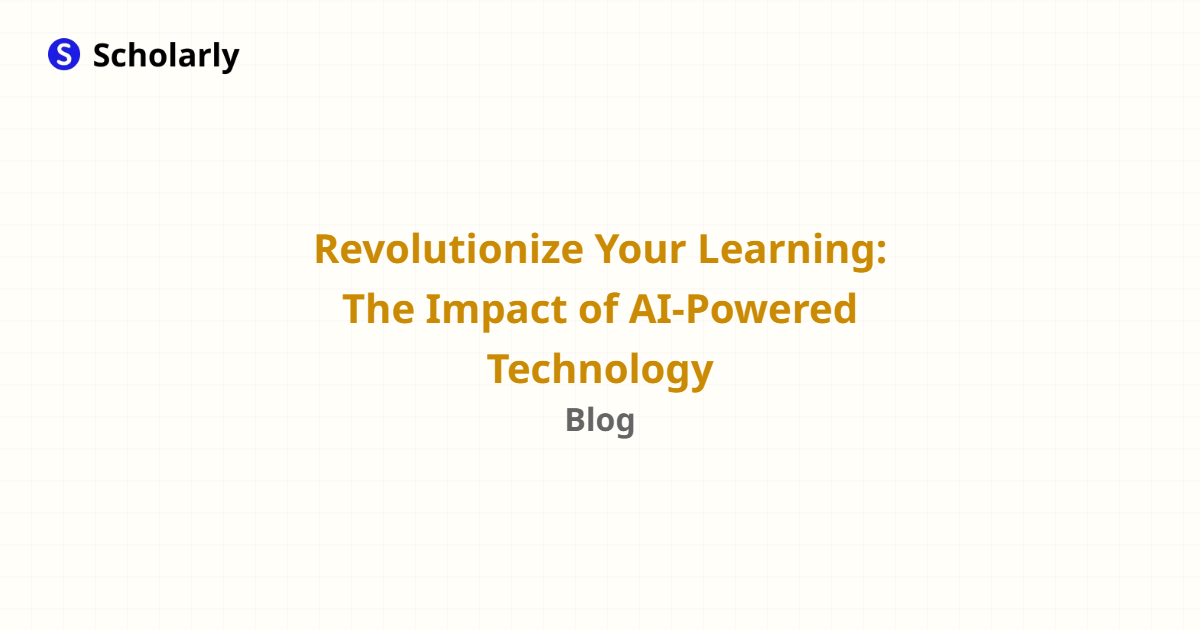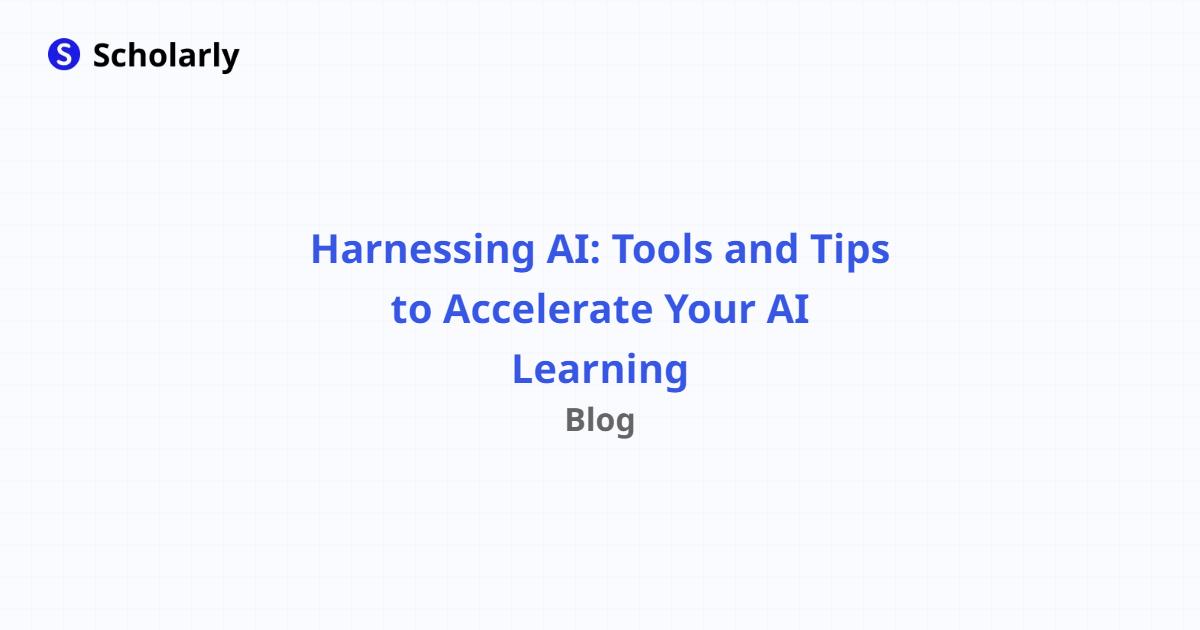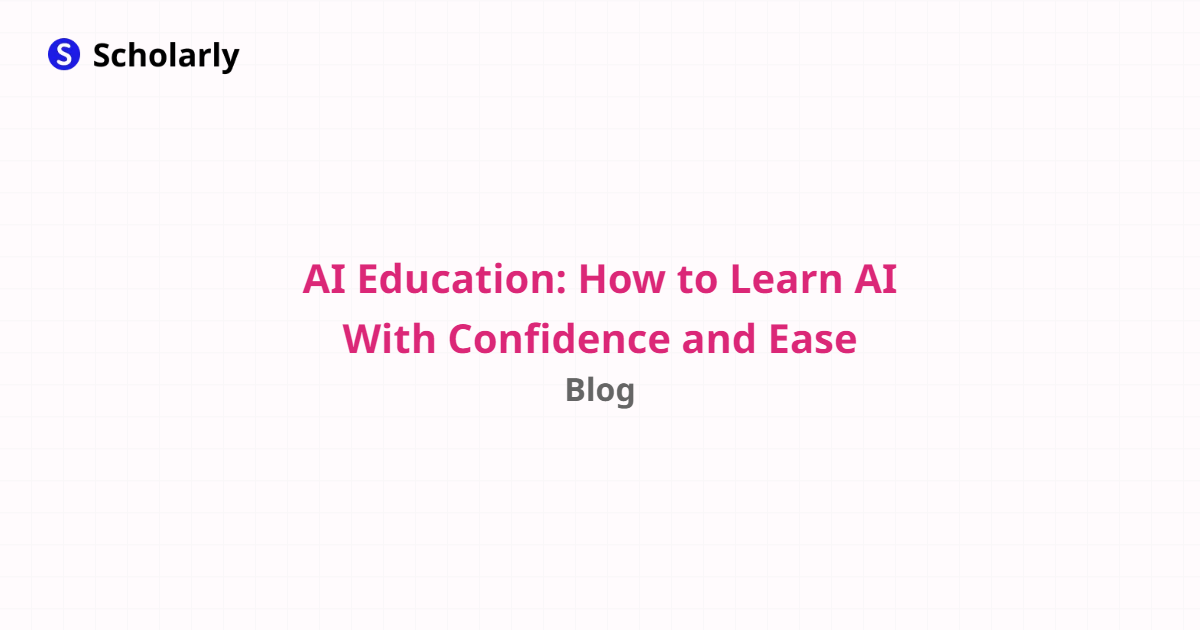Published in General
AI Technologies for Enhancing School Homework
By Scholarly
7 min read
Introduction
In today's digital era, artificial intelligence (AI) is transforming various aspects of our lives, including education. One area where AI has immense potential is in enhancing school homework. By leveraging advanced algorithms and machine learning techniques, AI technologies can provide students with personalized assistance, streamline the learning process, and promote academic success. In this article, we will explore the history, benefits, best practices, challenges, and the future state of AI technologies for enhancing school homework.
History
Past State
In the past, completing school homework was a solitary task that often lacked personalized support. Students would rely on textbooks, reference materials, and occasional assistance from teachers or peers. The traditional approach limited the learning experience and failed to cater to the individual needs of students.
Current State
With the advent of AI technologies, the current state of school homework has witnessed significant advancements. AI-powered educational platforms and applications offer intelligent tools that aid students in various subjects, providing real-time feedback, generating practice questions, and suggesting personalized learning resources.
Future State
The future of school homework with AI technologies holds immense promise. Imagine an intelligent virtual assistant capable of understanding complex homework problems, providing step-by-step explanations, and adapting to each student's unique learning style. With advancements in natural language processing, computer vision, and data analytics, AI will revolutionize the way students approach and complete their homework assignments.
Benefits
Utilizing AI technologies for enhancing school homework offers several benefits:
Personalized Learning: AI-powered platforms can customize the learning experience based on each student's strengths, weaknesses, and learning pace.
Instant Feedback: AI algorithms can provide immediate feedback on students' answers, helping them identify and correct their mistakes in real-time.
Access to Resources: AI-powered educational platforms can recommend relevant learning resources, such as videos, articles, and interactive tutorials, to supplement students' understanding of the homework topics.
Time Efficiency: AI technologies can automate routine tasks like grading, allowing teachers to focus more on providing guidance and individualized support to students.
Enhanced Engagement: Gamification elements and interactive features integrated into AI-powered platforms can boost student engagement and motivation in completing homework assignments.
Significance
The significance of AI technologies for enhancing school homework cannot be overstated. By offering personalized support, instant feedback, and access to a wide range of resources, AI empowers students to take control of their learning. It fosters a growth mindset, encourages active participation, and promotes independent problem-solving skills. With AI technologies, students can develop a deeper understanding of the concepts, leading to improved academic performance.
Best Practices
To harness the full potential of AI technologies for enhancing school homework, here are some best practices:
Integration with Curriculum: AI tools should align with the curriculum to ensure they complement and enhance the learning objectives.
Teacher Involvement: Teachers play a crucial role in facilitating the use of AI technologies for homework. They should guide students in effectively utilizing the available AI tools and provide valuable insights.
Continuous Improvement: AI technologies should have the capability to adapt and improve based on data analysis, user feedback, and evolving educational needs.
Ethical Considerations: As AI technologies become more pervasive, it is essential to address ethical concerns related to data privacy, security, and algorithmic bias.
Flexibility and Customizability: AI-powered platforms should offer flexibility to accommodate diverse learning styles and cater to individual learning needs.
Pros and Cons
AI technologies for enhancing school homework come with their own set of pros and cons:
Pros
- Personalized assistance tailored to individual learning needs
- Instant feedback and correction
- Access to a wide range of educational resources
- Automation of routine tasks
- Enhanced student engagement and motivation
Cons
- Dependency on technology
- Ethical concerns regarding data privacy and security
- Potential biases in algorithms
- Initial setup and learning curve for teachers and students
- The need for reliable internet connectivity
Comparison
Let's compare some popular AI-powered platforms for enhancing school homework:
Socratic by Google - Socratic is a mobile app that uses AI to provide step-by-step explanations for homework problems in various subjects. The app supports the use of natural language and even provides solutions for handwritten questions.
Khan Academy - Khan Academy is a widely known platform that offers personalized learning resources and practice exercises. Their adaptive learning algorithms help students progress at their own pace.
Chegg Study - Chegg Study provides on-demand homework help and textbook solutions. It utilizes AI to understand the student's input and provides relevant explanations and resources.
Photomath - Photomath is a camera calculator app that allows students to take a picture of a math problem and provides instant step-by-step solutions.
Quizlet - Quizlet is a platform that helps students create and study digital flashcards. It uses AI to adapt to the individual learning progress and provide targeted review materials.
AI Impact
AI Applications
AI technologies have numerous applications in the field of education, such as:
- Personalized learning
- Adaptive assessment
- Intelligent tutoring systems
- Automated grading and feedback
AI Techniques
AI techniques employed in enhancing school homework include:
- Natural language processing
- Computer vision
- Machine learning
- Data analytics
AI Benefits
The benefits of utilizing AI in school homework extend beyond individual learning. AI technologies can assist teachers in identifying knowledge gaps and tailoring instruction to meet student's needs. They can also provide valuable insights to education policymakers and contribute to evidence-based decision-making.
AI Challenges
While AI presents tremendous opportunities, it also comes with its share of challenges. Some of the key challenges in using AI technologies for school homework include:
- Ensuring fairness and transparency in algorithmic decisions
- Addressing biases and avoiding perpetuation of stereotypes
- Protecting student data privacy and security
- Overcoming the digital divide to provide equitable access to AI-powered tools
Potential Online Apps that Relate to the Topic
Grammarly - Grammarly is an AI-powered writing assistant that helps students improve their writing skills by providing real-time grammar and spelling suggestions.
Cram.com - Cram.com is an online platform that allows students to create, study, and share flashcards. It uses AI algorithms to personalize the learning experience and optimize study sessions.
Wolfram Alpha - Wolfram Alpha is a computational knowledge engine that can answer a wide range of questions and perform calculations. It can be a useful tool for students seeking quick answers or exploring complex concepts.
EduBirdie - EduBirdie offers AI-driven academic writing services, assisting students in generating well-structured and plagiarism-free essays, research papers, and other assignments.
Plickers - Plickers is an interactive classroom assessment tool that uses AI to capture real-time feedback from students using printable paper cards.
Conclusion
AI technologies have the potential to revolutionize the way students approach and complete their school homework. By providing personalized learning, instant feedback, and access to a wide range of resources, AI empowers students to become active learners and fosters academic success. However, it is crucial to address ethical concerns, promote teacher involvement, and ensure equitable access to AI-powered tools. As AI continues to evolve, it holds the key to transforming education and preparing students for a future driven by technological advancements.




